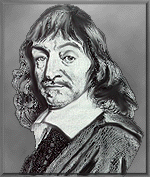
The Ontological Argument: Redux
Rene Descartes' Arguments for God's Existence
- An Epistemological Preface: Rationalism
- Fallibility of the senses
- The Soul as "thinking thing"
- Innate Ideas (that which is "clear and distinct")
- God insures empirical knowledge
- The Ontological Argument revisited:
- 'God' exists as an innate idea in the mind
- 'God' is the Supremely Perfect Being (SPB) - the 3-O God plus �
- actual
- eternal
- P1 I have the idea 'god' (the supremely perfect being) in my mind.
- P2 The idea 'god' is an innate idea.
- P2.1 The idea 'god' could not come from the senses.
- P2.2 I could not have created the idea 'god' on my own.
- P2C Something outside myself placed the idea in my mind.
- P3 The idea 'god' contains within it the idea of existence.
- C Therefore, God (the SPB) exists.
Note: simply because the idea 'god' implies existence,
it does not follow that God actually exists, if I can imagine 'god' without 'existence'.
- God exists necessarily (i.e., I cannot conceive of God not existing.)
- P1 'God' is the supremely perfect being.
- P2 Existence is one quality of perfection (along with power, goodness, knowledge, etc.)
- C 'God' cannot be conceived without existence.
- P3 If the SPB exists, its existence must be no less than perfect (i.e., actual and necessary).
- P4 God exists.
- C Therefore, God exists actually and necessarily.
- God is the only conceivable thing whose essence contains necessary existence.
Return to Notes Index
Return to Barry's HP
